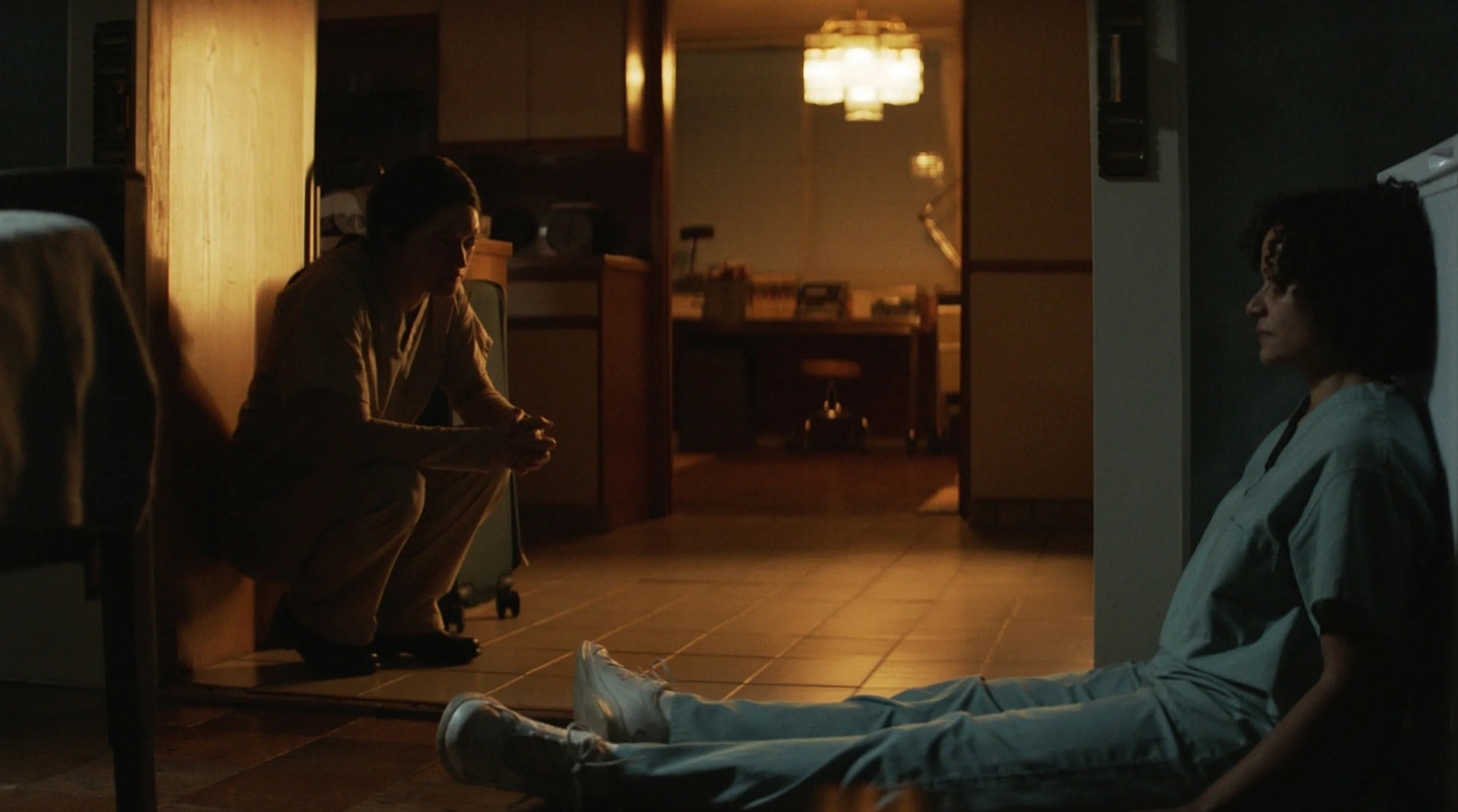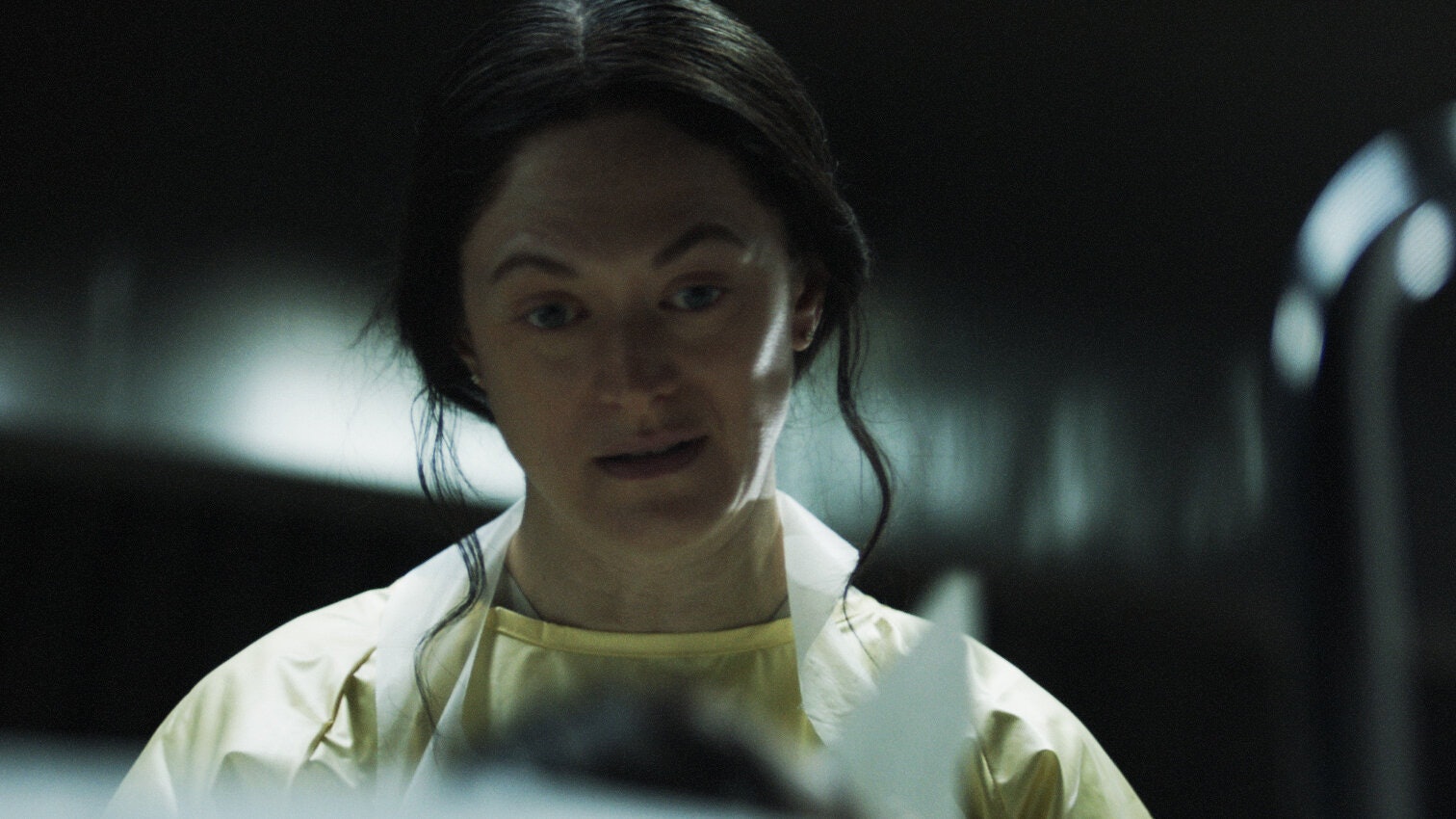
Despite decades of screen adaptations and an iconic place in popular culture, Frankenstein remains misunderstood. New versions often take more cues from the 1931 movie than from Mary Shelley’s novel, reducing the lead to a mad scientist archetype. As a result, new viewers miss out on the sheer weirdness of Victor Frankenstein’s original characterization as an arrogant young student with an incestuous backstory, dogged by tragedy and raised on an intellectual diet of outdated alchemical pseudoscience. Most adaptations barely scratch the surface of his idiosyncratic personality.
Laura Moss’ Birth/Rebirth does not have that problem. Marin Ireland stars as a Frankenstein-inspired pathologist, a peculiar and socially maladjusted woman with fascinatingly ironclad levels of self-belief. Only someone with unique values and motives could end up where she is, dedicating her life to a single, secretive mission: reanimating a human corpse.
The film quickly establishes Dr. Rose Casper as a jarringly offputting individual. Her typical workday involves dissecting corpses, hauling a mysterious suitcase out of the morgue, perfunctorily seducing a random man so she can steal his semen, and impregnating herself while her pet pig loiters nearby. She’ll soon steal the body of a recently deceased 6-year-old girl and smuggle it home for her private experiments.
Set in the present day, Birth/Rebirth is one of 2023’s most gripping horror movies, a grotesque tale of resurrection and reproduction offering a gender-bent take on Frankenstein. There’s a bounty of unsettling material here concerning motherhood, childbirth, and abortion, all taken to extremes we rarely see in the puritanical landscape of American cinema. It’s a fitting tribute to a novel that some critics have argued was inspired by Shelley’s traumatic miscarriages.
Rather than making a straightforward feminist statement like the recent Invisible Man reboot, Birth/Rebirth simply invites us to enjoy women being erratic, disturbing, and morally troublesome. At its center is an odd-couple partnership between the eccentric Dr. Casper and a no-nonsense maternity nurse, Celie Morales.

In a sly piece of casting, Celie is played by Judy Reyes, beloved for her role as nurse Carla Espinoza in Scrubs. Here, we meet her as an overworked single mom. While Rose lurks downstairs in the morgue, Celie leads a normal life until her daughter Lila dies unexpectedly, and her body goes missing from the hospital. Desperate with grief, Celie follows her daughter’s paper trail to the morgue and then to Rose’s apartment, where she discovers Lila tucked in bed, comatose and plugged into a life support system. After years of experiments, Rose has finally resurrected a dead body. But as any genre-savvy viewer can guess, this achievement will come at a price.
Celie, of course, will do anything to keep her daughter alive. So begins an unlikely collaboration, with Celie assisting Rose in maintaining Lila’s illegal and unethical “treatment.” It’s a morbid kind of Holmes/Watson dynamic, positioning Celie as a relatable protagonist opposite Ireland’s abrasive performance and witchy appearance. One woman is a caregiver, while the other views the human body with brutally clinical detachment. Yet they share the same goals, blurring the line between ghoulishness and medical care.
Director and co-writer Laura Moss isn’t shy about embracing mad scientist tropes, paired with teasing hints of zombie and vampire lore. Will Lila ever fully recover, or has Rose done more harm than good? Like Frankenstein’s creature, Lila is an innocent party. Rose is the one who bulldozed through social taboos and medical ethics in her quest to conquer mortality. But Celie has more skin in the game, and she pushes to keep her daughter alive no matter what.

Like all good body horror movies, Birth/Rebirth is guaranteed to be divisive. Certain scenes provoked laughter from the women in the theatrical audience, and dead silence from the men. Moss’ vision is transgressive and deliciously unpleasant, challenging taboos around parenthood and bodily autonomy. While some of the film’s medical horror is rooted in straightforward gore, other elements are more grounded, exposing realistic fears around reproductive healthcare.
This balance between gruesomeness and psychological precision is what makes Birth/Rebirth such a compelling debut feature, welcoming Moss into a promising new generation of post-Cronenbergian body horror filmmakers. Marin Ireland’s bold performance is more than worth your time, building her already-impressive resume of indie horror roles. Together, they offer an appropriately modern take on Frankenstein, one that reimagines and digs into the good doctor rather than simply aping him.
Birth/Rebirth is streaming on Shudder.







